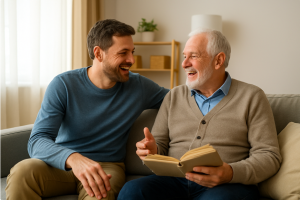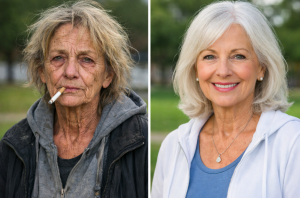First and foremost, I’d like to thank my younger brother who also flew from Copenhegan to home on my request.
We both wanted to visit our dad this time.
Though it was a short three week trip, it was very worthwhile.
For the last many years, I visited my home every year but this was a different experience for me to go back home from Chicago thinking a lot different about my dad than previous years.
My dad is very old now, he is 92.
By the grace of God, he is still active with all normal activities, not any chronic disease or any disorder except normal minor aging issues.
My dad was very interested in talking and inquisitive in many past years.
Neural simultaneity between father and son
But time is different now, he wanted to talk to us about many things but he had a hard time to finish sentences as well as synchronize what he was trying to say.
But still I was absorbing what he was saying.
I would comprehend what he said because my brain aligned with him all the time.
At many moments, I also noticed that his body, pulse, facial expression would synchronize with me, probably due to the same genes.
This all was happening due to the same body chemistry, and, of course, this was neural simultaneity between us.
Sometimes, I also felt, I would mirror his speaking and listening style.
I really felt the essence of dad and son bonding that nature has given to all of us, if we go deeper in our conversation and listening.
I felt like I was the happiest son in the world when he would stare at me with no words in his mouth.
I would ask do you want to say something?
He would nod meaning ‘no’.
I wanted to know how to live a more meaningful life from his life perspective.
And, of course, he was sharing many things by his expressions rather than words.
He would try to say a lot but his memory and mouth didn’t allow that much but I understood completely what he was trying to say.
On this visit, I couldn’t talk much to him because he was gradually losing a lot of his memories.
And, I also realized probably this is normal considering his age, I don’t know, I am doing some research on it at the moment.
I tried to remind him about trips, occasions, and activities that we had taken together.
I asked questions about my grandmother but mostly he replied with short but emotional answers.
I had no idea what was going through his mind.
The last time I had known about memory loss was when my maternal grandmother was reaching 100 years old.
I had read but never thought this before that when our brain becomes older, we forget things so fast.
And I am seeing this in patterns continuously with my old family members, at least I saw it in my paternal grandmother, my maternal grandfather, my maternal grandmother, and now slowly catching up to my dad.
Fatherhood and responsibility
At one point, my dad was talking about the challenges of juggling work and fatherhood.
“It was a continuous struggle,” he said.
He recalled his struggle to raise us and was trying to correlate this with my three kids that I am raising now.
He always felt as if he was letting someone down, having to choose between a good social worker or a good dad.
At that moment, I tried to correlate my dad to our former president Barack Obama’s journey into adulthood, his search for community and his place in that community that I read in his book.
In “Dreams from My Father” the former president and author Barack Obama says, “sometimes you can’t worry about hurt, sometimes you worry only about getting where you have to go.”
I quickly understood that my dad was indicating my mom and how much responsibilities she took to raise us.
I realized that father-son conversations are the most powerful thing on earth.
This conversation between us was not just a fun and formal conversation.
It was an act of humility and respect, a pure learning experience for me.
It was also a conversation of pain and suffering along with time and progression of our family.
Once he talked about Thomas Edison and Nikola Tesla, though he couldn’t remember these names, I was amazed.
The beauty of electricity, electric lights, the telephone, the radio, the refrigerator, and the automobile, all the buzz and the news, his life went through.
He was pointing to my smart phone that I used everyday to talk in video calls from Chicago.
He said, “The world was changing the way in which I went about my life, and the population was soaring to unimaginable heights.”
According to him, since the early 1800s, there had been waves of immigration, but the trend was now accelerating like it never had before.
He was trying to connect his intention to me and my younger brother’s movements as we both live in America and Europe now.
During this trip, I spent the whole three weeks at home in Jhapa with my parents.
I asked my dad many questions which were kind of short and they often had a conversational dead end after a sentence of his answer.
I asked him questions like which place is best to live, Jhapa or Terhathum?
Do you remember your school?
I completely understood that these questions didn’t create any values or experiences for him.
They didn’t invite any vulnerabilities.
But when I asked him, “What do you like about our family to live in Jhapa?”
He said, “friendship and struggle.”
That question excited him to share his preferences, beliefs, and values that he nurtured with our family in Jhapa.
It made him emotional.
He went with a long answer with back and forth conversation.
I asked him, “how many of your friends are still around?”
He replied, “most of them already became dear to God, I don’t remember anybody now.”
Emotions and father-son bonding
Emotions are critical for any lasting conversation especially between aging dad and son.
This was guiding me what he was saying and how I was hearing and in a lot of cases without me realizing that we both were emotional.
I was in his emotions so that I was purely listening.
I was listening to what he was not saying so that I was revealing beneath the surface of his words.
I was recalling Elaine Clayton, an artist and the author of “The Way of the Empath” where she says, “an empath’s life is not an ordinary life, it requires the strength of a lion, because it takes real courage to be empathic.”
I was reading my dad’s expressions and gestures, not words.
I don’t know why, maybe from experience I was listening without thinking about what my dad was saying because he was talking about very intimate things about our family.
He was trying to join all the small pieces of our family together.
The lessons I learned from this visit from my dad are immense.
It’s almost impossible to express in this small piece of writing.
Conclusion
But one learning that I would like to share with you all is this: If you want to connect with someone, especially with old people like dad or mom or granddad or grandmom, ask them what they are feeling at the moment, and then reveal your own emotions with them.
This conversation with my dad became a tool by inviting him to reveal his vulnerabilities and then I also became vulnerable in return.
Charles Duhigg, author of “Supercommunicators” says “if we acknowledge someone else’s vulnerability, and become vulnerable in return, we build trust, understanding, and connection.”
Exactly the way Duhigg mentions, I also revealed something about me as my dad’s son which I never revealed before.
I revealed we humans are amazing creatures.
We all crave for real connections whatever our situations are and how far we are.
We all want meaningful conversations whatever the age is especially when we are retired and stay at home with our family.
Thank you so much dad for everything that you have done for our family.
I love you and see you soon.
Happy Father’s Day everyone.
Yam Timsina, PhD, writes primarily on health basics, scientific progress, social upliftment, and value creation.
Disclaimer: “Please note that some links in this post are affiliate links, which means I may receive a small commission if you make a purchase through them, at no extra cost to you.”





